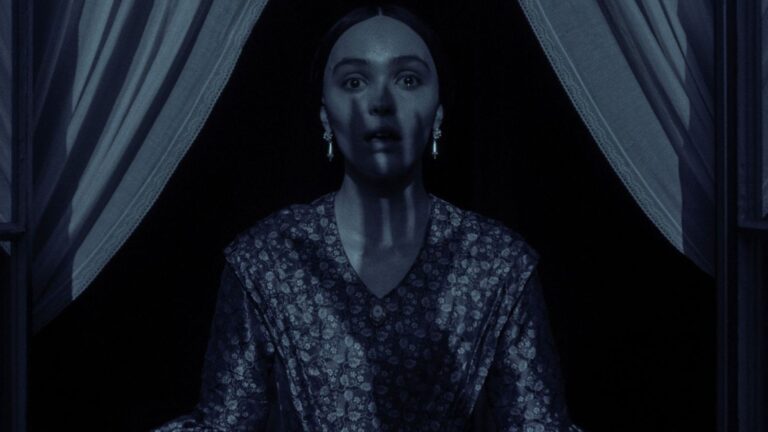Nosferatu (2024 | USA, UK, Hungary | 133m | Robert Eggers)
Writer/director Robert Eggers represents a genuine rarity in modern cinema—an idiosyncratic auteur who’s managed to make precisely the movies he wants to make, to the tune of critical acclaim and (most of the time, at least) financial success.
His oeuvre to date consists entirely of fastidiously researched, elegantly mounted period films that invariably smear their austerity and arty pretense with visceral grittiness and singular eccentricity—Kubrick’s meticulous formal style entering a Faustian bargain with genre-movie grotesquerie and absurdism.
This unholy cinematic pact’s worked famously so far (on me, at least), whether Eggers is offering a dark yet sympathetic take on feminist empowerment with The Witch; reveling in the unsettling and crudely hilarious rot of mortality and insanity that marinates The Lighthouse; or taking a bluntly Nordic club to proto-Shakespearean dramatics in The Northman. Consequently, it’s hard to envision Eggers’ take on an established property like Nosferatu being anything less than an aesthetic slam dunk. And the overall critical reaction seems to bear this out.
It therefore hurts my heart a little to have to be That Guy. I wanted to like Robert Eggers’ brand-new reimagining of the 1922 gothic/expressionist horror classic. I really did. And on the face of it, it serves up many of the ingredients that have made the director’s previous efforts so compelling. But from this cramped perspective, Nosferatu marks his first straight-up misfire, and his least effective feature to date.
On a superficial level, this take on the Nosferatu story (itself a very thinly-veiled remake of Dracula) hits most of the familiar beats. The earnest Thomas Hutter (Nicholas Hoult) reluctantly journeys to Eastern Europe to hash out legal details between his firm and the mysterious Count Orlok (Bill Skarsgard), as the latter purchases an antique estate in Wisburg, Germany.
The impending sale promises to boost Thomas’s income and position, but his wife Ellen (Lily-Rose Depp) suffers from strong nightmares/premonitions of misfortune, and she urges him not to make the trek. Thomas journeys to Transylvania anyway, and shortly after arriving at the count’s castle, he’s assaulted and imprisoned. And before you can say “I never drink…wine,” Orlok touches down in Germany, bringing pestilence and a decidedly vampiric appetite with him.
As with every one of his films, Eggers’ Nosferatu brims with carefully-constructed period detail, and a cabinet full of text and subtext. There’s a magnificent passage where Thomas finds himself in a Romany village; you could cut the atmosphere—and the acrid xenophobia coiled inside the villagers—with a knife. Ellen’s gorgeously expressionistic nightmare visions turn out to be Orlok invading her dreams, and in his repugnant way, the monster’s contributing to her sexual awakening. Throughout the familiar twists and turns of the story, every bit of minutiae—from the rural Eastern European countryside, to the ornate architecture and decoration filigreeing every structure and room in every frame, to the chillingly-realized netherworld of nightmares inundating poor Ellen’s psyche—can’t help but take your breath away. It’s hard to imagine a more visually stunning movie surfacing by the end of this year.
The cast that Eggers has assembled likewise does their fair share to further his vision, hitting all the intended notes embedded in the screenplay. Hoult navigates the transformation from wide-eyed naif to trauma-scarred victim well, Willem Dafoe leavens his eccentric vampire hunter’s operatic intensity with a healthy dose of cock-eyed humor, Aaron Taylor-Johnson’s skepticism and anger at the rapidly-spiraling supernatural menace feels organic and real, and Depp’s primal physicality elicits some of the movie’s most bone-chilling moments.
But there’s something missing at the center–namely, a heart. The cornucopia of amazing elements at its disposal makes Nosferatu’s lack of emotional connection even more frustrating. Eggers’ previous movies all somehow managed to extract some sense of relatable humanity from their hyper-detailed, historically accurate surfaces. No such luck here. The admittedly disturbing, arresting imagery running rife through the movie seldom feels like anything more substantial than elaborately ornate window dressing, and with most of the human characters sketched out in the broadest of terms, the stakes feel curiously abstract and uninvolving.
And that lack of a heart in its undeniably impressive framework points up the movie’s biggest liability: Bluntly put, it ain’t scary.
Disturbing imagery abounds, with the queasy accuracy of the plague scenes hammering things home in especially harrowing fashion. But as the vampiric Count Orlok, Skarsgard’s absurdly thick accent is swaddled in an echo so cavernous that it’s damn near unintelligible. And while Eggers and his design team have laudably, deliberately diverged from aping the iconic visage of the original Count Orlok/Nosferatu, their alternative resembles nothing more than an extra-repugnant version of Gary Oldman’s Dracula, replete with droopy mustache, receding hairline, and a complexion rough enough to give any pimply teenager sympathy pains. To paraphrase an extra-lame but too-perfect Dad Joke: The Orlok in this remake may have fangs, but he—like the lavish yet emotionally remote production around him—feels pretty toothless.
Nosferatu opens in theaters everywhere Christmas Day.




